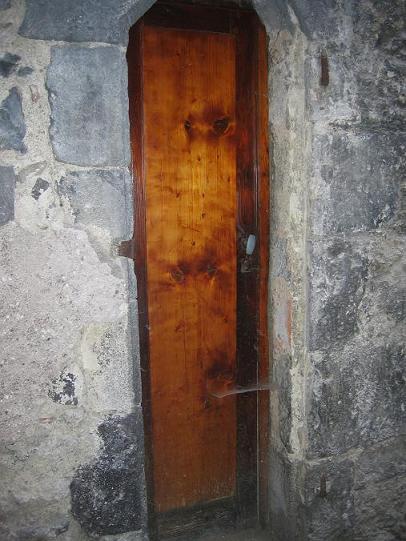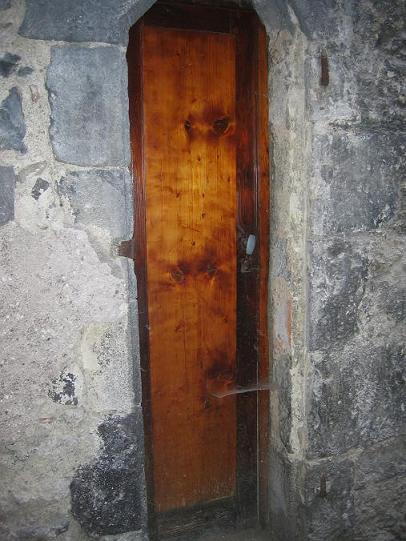有一個人對耶穌說:「主,得救的人果然不多嗎?」
耶穌對群眾說:「你們竭力由窄門進入吧!我告訴你們:因為將來有許多人,想要進去,卻不能進去。及至家主起來,把門關上,你們在外面站著,開始敲門,說:主,請給我們開門吧!他要回答你們說:我不認識你們是那裡的。那時,你們會說:我們曾在你面前,吃過喝過;你也曾在我們的街市,施教過。
「他要說:我告訴你們:我不認識你們是那裡的;你們這些作惡的人,都離開我吧!
「幾時你們望見亞巴郎、依撒格、雅各伯,及眾先知,在天主的國裡,你們卻被摒棄在外面,你們只有哀號和切齒。將有從東從西,從北從南而來的人,參加天主國裡的筵席。
「看!有最後的,將成為最先的,也有最先的,將成為最後的。」
路加福音 13:22-30
 當耶穌談及窄門時,祂說我們要「竭力」,除非我們用意志勇敢地奮鬥,我們是不能抵擋世俗的巨浪的,我們的靈魂將再次被投進深淵。在世上,導入喪亡的道路十分寬闊,而導入生命的路是多麼狹窄,稍微轉身,不論轉左或轉右,都是很危險的,就像在一道橋上,滑向哪一邊都會跌入河裡。人的靈魂左搖右擺,有時候當想到永遠的時候,人會選擇行善,而在其他時候,當人只想著現在的一刻,他寧願選擇享樂。
當耶穌談及窄門時,祂說我們要「竭力」,除非我們用意志勇敢地奮鬥,我們是不能抵擋世俗的巨浪的,我們的靈魂將再次被投進深淵。在世上,導入喪亡的道路十分寬闊,而導入生命的路是多麼狹窄,稍微轉身,不論轉左或轉右,都是很危險的,就像在一道橋上,滑向哪一邊都會跌入河裡。人的靈魂左搖右擺,有時候當想到永遠的時候,人會選擇行善,而在其他時候,當人只想著現在的一刻,他寧願選擇享樂。
家主是基督,祂身為天主,無處不在。即使祂在天上,祂清晰的臨在於那些悅樂祂的人內;而為那些仍在塵世的朝聖途上奮鬥的人,祂在暗中扶持。當祂使整個教會注視祂時,祂會進來,並把門關上,那時墮落的人再沒有機會悔改。站在外面的人會敲門,懇求祂的憐憫,但再哀求也是徒然。
這些全適用於基督徒身上。我們在彌撒中領受基督的聖體聖血,祂在我們靈魂的大街上施教。但這盛宴不會得到不虔誠的人的喜愛。對聖經的熟悉也不會使天主認識他,邪惡的行為使他不配進入天國:「他要說:我告訴你們:我不認識你們是那裡的;你們這些作惡的人,都離開我吧!」
有很多人起初充滿熱忱,之後冷卻下來;亦有很多人起初冷漠,在一瞬間卻變得熱情;很多在世上被鄙視的人在來世會享光榮;而另一些被人稱譽的,最終會被問罪。
Luke 13:22-30
When Jesus was about to speak of the entrance of the narrow gate, He said first, strive, for unless the mind struggles manfully, the wave of the world is not overcome, by which the soul is ever thrown back again into the deep. For as in earthly life the departure from what is right is exceeding broad, so he who leaves the path which leads to the kingdom of heaven, finds himself in a vast extent of error. But the right way is narrow, the slightest turning aside being full of danger, whether to the right or to the left, as on a bridge, where he who slips on either side is thrown into the river. For the soul wavers to and fro, at one time choosing virtue when it considers eternity, at another preferring pleasures when it looks to the present.
The master of the house is Christ, who since as very God He is every where, is already said to be within those whom He gladdens with His visible presence though He is in heaven, but invisible to those whom He helps in secret while they are still contending in this earthly pilgrimage. But He will enter in when He shall bring the whole Church to the contemplation of Himself. He will shut the door when He shall take away from the reprobate all room for repentance. Who standing outside will knock, that is separated from the righteous, will in vain implore that mercy which they have despised.
These things apply to Christians. For we eat the body of Christ and drink His blood as often as we approach the mystic table at Mass, and He teaches in the streets of our souls, which are open to receive Him. The banquet does not delight one who is impious. The knowledge of the Scriptures does not make him known to God, whose iniquitous works proves to be unworthy; as it follows, "And he will say to you, I know not whence you are; depart from me."
Many at first burning with zeal, afterwards grow cold; many at first cold, on a sudden become warm; many despised in this world, will be glorified in the world to come; others renowned among men, will in the end be condemned.
References:
On the Gospel of Luke (St. Bede the Venerable)
Explanations on the New Testament (St. Theophylact of Ochrid)
In Regulas Brevius Tractatus (St. Basil the Great)
Homily in Psalm 1 (St. Basil the Great)
Morals on the Book of Job, Book XI (St. Gregory the Great)
